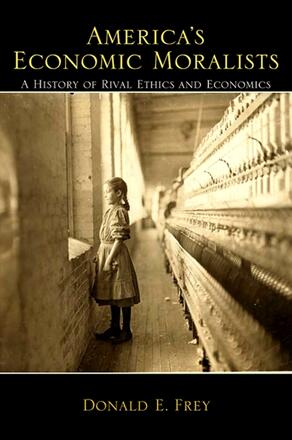
America's Economic Moralists
A History of Rival Ethics and Economics
Alternative formats available from:
Traces the history of two rival American economic moralities from colonial times to the present.
Description
Since colonial times, two discernable schools have debated major issues of economic morality in America. The central norm of one morality is the freedom, or autonomy, of the individual and defines virtues, vices, obligations, and rights by how they contribute to that freedom. The other morality is relational and defines economic ethics in terms of behaviors mandated by human connectedness. America's Economic Moralists shows how each morality has been composed of an ethical outlook paired with a compatible economic theory, each supporting the other. Donald E. Frey adopts a multidisciplinary approach, not only drawing upon historical economic thought, American religious thought, and ethics, but also finding threads of economic morality in novels, government policies, and popular writings. He uses the history of these two supported yet very different views to explain the culture of excess that permeates the morality of today's economic landscape.
Donald E. Frey is Professor of Economics at Wake Forest University and the author of Tuition Tax Credits for Private Education: An Economic Analysis.
Reviews
"…Frey provides an interesting history of two ethical streams within American political economy. The result is an extensive account of those individuals throughout American history who have unabashedly promoted normative economic values … There is no doubt that economic historians, seminarians, and those generally interested in the history of economic thought would greatly benefit from reading Frey's book. " — History of Economic Ideas
"Donald Frey, in a gem of a book, lays out the arguments made over more than three centuries in America regarding the appropriate balance between pursuit of self-interest and obligation to community … a major contribution to the history of economic thought. " — Journal of the History of Economic Thought
"Do not be deceived by the apparent thinness of this book. The mere 216 pages are dense, the subject is weighty … there is probably no one out there except for Frey who brings to the subject of economics and ethics the impressive historical breadth of this book. " — Research in the History of Economic Thought and Methodology
"…a monumental project that surveys the work of over 100 writers and their treatment of autonomy and relational morality … America's Economic Moralists is an invaluable resource. Frey's two categories of moralists provide an innovative typology around which constructive discussion of morality and economics can occur. " — Christian Century
"…a book full of new thoughts and ideas … It is a book that is needed and ought to be widely read so that everyone might come to understand what lies behind their thinking. " — Review of Social Economics
"…America's Economic Moralists is one of those still rare academic explorations of this subject … The strength of Frey's book lies in the author's ability to condense the study of a quite large number of schools of economic morality into workable, chronologically directed chapters … provide[s] a useful lens for thinking through competing visions of economic morality in America, and underscores the truth that there is no such thing as a value-free economic science. " — EH. net
"…Frey's book is a timely and welcome contribution to the literature on ethics in business and economics. He provides scholars the much-needed historical background on the development of thoughts related to economic morality since Colonial times. " — CHOICE